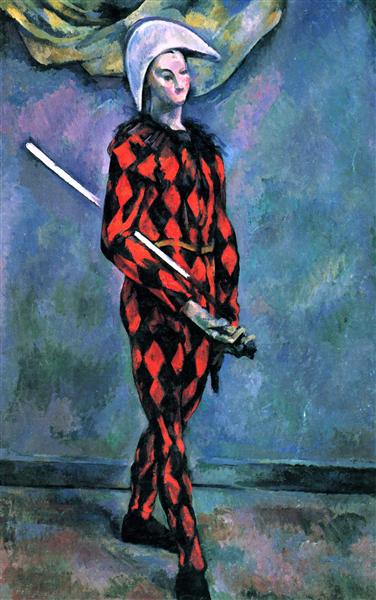Description
L'œuvre "Arlequín" de Paul Cézanne, peinte en 1890, est un exemple fascinant de la transition entre l'impressionnisme et la post-impressionnisme, une période où l'artiste a commencé à définir sa propre voix, s'éloignant des conventions du passé et entrant dans une approche plus personnelle et abstraite de l'art. Dans cette peinture, Cézanne dépeint un personnage dans un costume de Harlequin coloré, qui est présenté avec un look énigmatique, faisant référence aux couches de complexité émotionnelle que l'artiste a pu évoquer par sa technique.
Le personnage, avec son costume de losange caractéristique, est situé au centre de la composition, entouré d'un fond qui semble osciller entre la représentation d'un espace intime et un assemblage presque abstrait. Les couleurs vibrantes du costume contrastent avec le fond le plus sombre et le plus diffus, résultant en un jeu visuel qui capture l'attention du spectateur et établit un dialogue entre la figure et l'environnement. La palette de couleurs, riche en tons ocre, vert et bleu, révèle la maîtrise de Cézanne dans la manipulation de la couleur pour exprimer le volume et la profondeur, ainsi que son intérêt pour la construction de formes par la couleur.
La technique de Cézanne, caractérisée par son coup de pinceau épais et déterminé, permet d'insinurer les formes dans une construction presque sculpturale. Cette application de couleur et de forme donne non seulement vie à l'arlequin, mais suggère également un sentiment de mouvement et d'énergie, contrairement à l'immobilité de l'environnement. L'œuvre ressemble presque à un portrait psychologique, dans lequel l'identité de la harlequin transcende son déguisement et devient un symbole de la dualité entre l'être et l'opinion, entre l'émotion et la surface.
L'un des aspects les plus intrigants de "Harlequin" est la manière dont il remet en question les conventions de la représentation figurative. Cézanne, souvent considérée comme un précurseur du cubisme, commence à décomposer la figure humaine dans les plans géométriques, ce qui suggère que la réalité visuelle peut être interprétée sous différentes perspectives. La perspective unique et fragmentée que Cézanne infuse dans son travail devient une histoire cruciale pour les mouvements artistiques qui se poursuivraient au XXe siècle.
Cette image peut également être discutée dans le contexte des influences que Cézanne a vécu tout au long de sa carrière. Sa fascination pour la nature de la couleur et de la forme l'a amené à explorer la figure humaine de manière moins conventionnelle. "Arlequín" est un point culminant dans sa contribution à l'art moderne, reflétant une complexité qui invite plusieurs lectures, visuelles et émotionnelles.
Le travail respire l'histoire et l'émotion, enrichissant l'héritage de Cézanne en tant que pionnier qui a remis en question la perception de l'art et la nature de la représentation. "Arlequín" représente non seulement un éclair du monde du théâtre et de la comédie, mais est également un puissant rappel de la capacité de l'art à capturer l'essence de la condition humaine, située entre le visible et l'invisible, parmi la réalité et l'illusion . Ainsi, à travers ses coups de pinceau et sa vision unique, Cézanne parvient à quitter une empreinte qui continuera de résonner dans l'histoire de l'art.
KUADROS ©, une peinture célèbre sur votre mur.
Peintures à l'huile fabriquées à la main, avec la qualité des artistes professionnels et le sceau distinctif de KUADROS ©.
Service de reproduction des images avec garantie de satisfaction. Si vous n'êtes pas complètement satisfait de la réplique de votre peinture, nous remboursons votre argent à 100%.

